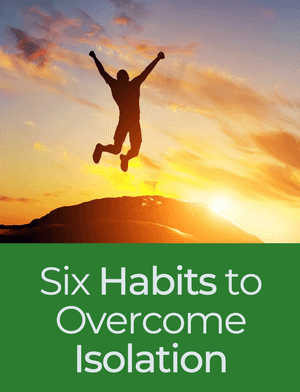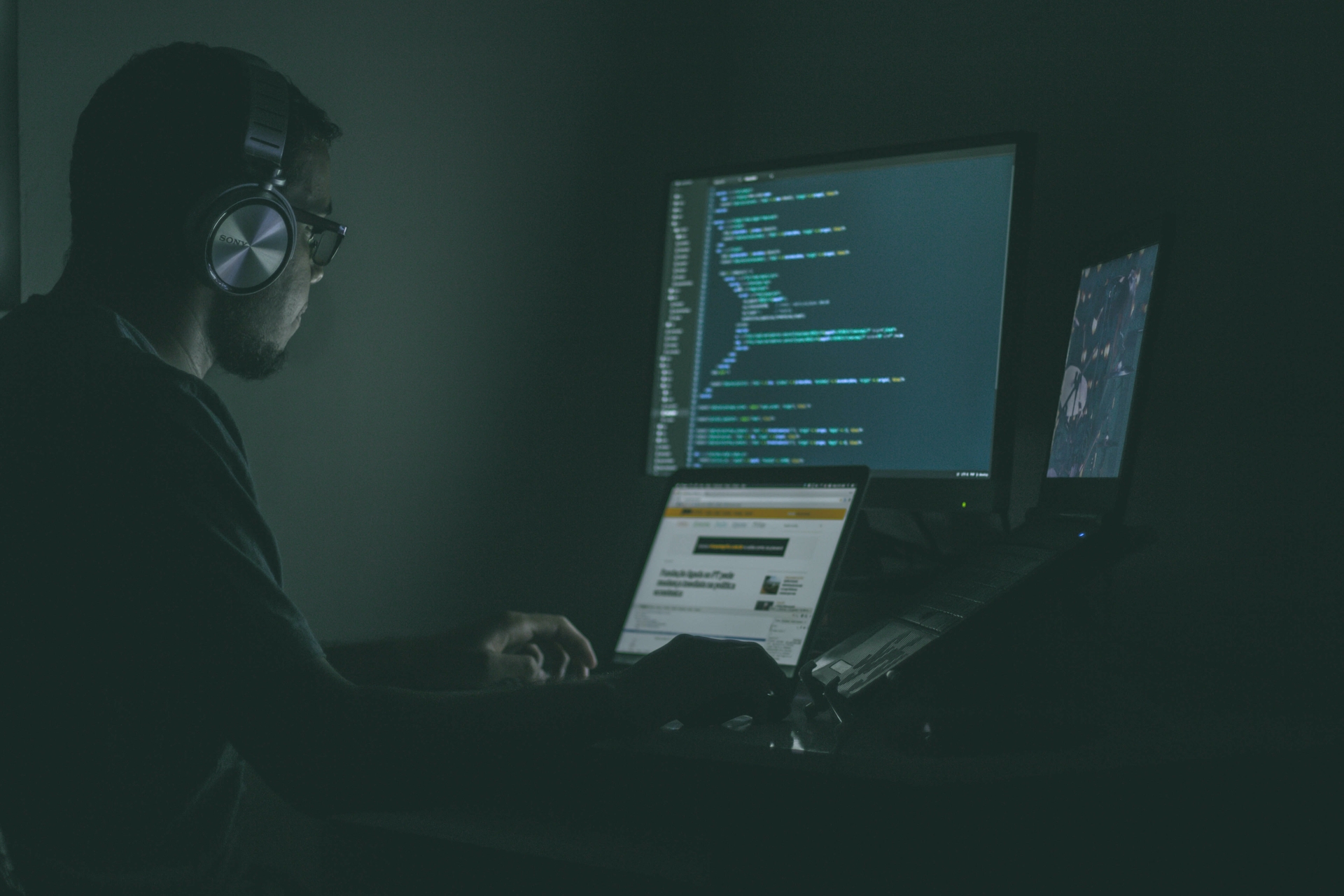
Get the Six Habits for Overcoming Isolation Guide for free


Loneliness is a topic that is often left unspoken. In our society, men opening up about their feelings is seen as weakness, and thus many feel ashamed to talk about it. But what if loneliness could actually harm us? What if we're not talking about it enough? Studies have shown that it can seriously impact our health and that community and social interactions are crucial for our well-being.
Listen to the podcast version of this blog:
When I was younger, I often felt shot down whenever I tried to open up about my feelings. I felt the only person I could actually talk to was my mom. The stoic Dutch culture I grew up in, the military, and my teenage years all seemed to teach me one lesson: Don't be weak. Suck it up and keep pushing forward. I benefited much from this mentality as I ruthlessly grew my career and physical health. But working hard only distracted me from what truly matters and resulted in chronic feelings of loneliness. Everything started changing when I finally found the courage to speak up for myself.
Statistics show more than half of young Americans don't feel close to anyone, and that number has doubled since the 1980s. Part of being human is that we all feel lonely at times. Even the most extroverted people have likely felt the urge to connect or experienced sadness from being unable to interact with someone. Being social is encoded in our genes because, during the process of evolution, it increased our chances of survival. Wanting to belong and having to feel needed is in our nature. We are genetically hardwired to respond to inputs from our environment. When you are thirsty, you drink. When you are hungry, you eat. And when you are lonely, your mind is communicating a desire to connect with others in order to feel safe.
I have a painful memory of my twenty-first birthday. After being born and raised in the Netherlands for the first twenty years of my life and having survived most kinds of abuse imaginable, I emigrated to the United States by enlisting in the US Air Force. After graduating from Basic Military Training, I was assigned to a pipeline under the Air Force Special Operations Command at Medina Air Force Base in Texas. I had trained for over a year to prepare my body for the physical onslaught, the instructors told us quite literally the purpose of the program was to break our bodies in order to filter out those that would. I spent my 21st birthday laying on my bunk with pain radiating down my spine and crushing feelings of loneliness. My family was on the other side of the Atlantic ocean and I had no friends on base. I slowly started losing hope for my future and, more importantly, trust in my body. When the medicine stopped working against the pain a while later, I quit the program and went into a long spiraling depression. I felt unlovable, weak, useless, and like the world's biggest failure.
Feeling lonely is perfectly healthy in the short term as it guides you toward the connections you need and crave. But these same feelings are very serious and dangerous in the long run. Studies have shown social isolation can literally kill someone. While social isolation isn't identical to feeling lonely, a meta-analysis found chronic feelings of loneliness increased the risk of premature death by ~30%, which is the same risk as smoking a pack of cigarettes a day or being medically obese.
Yet another study points out that socially isolated patients with a heart condition were three and a half times more likely to die than their counterparts with similar conditions but with solid support networks. Patients with fewer social interactions were also more likely to be hospitalized and visited their doctors more frequently.
Because the human species evolved to live in groups and depend on one another, being alone makes you more sensitive to threats. Research has shown loneliness is directly correlated to how we process threatening information and stimuli in our brain, suggesting that loneliness puts your body on red alert. This state of hyper-vigilance results in an increase in stress hormones and blood pressure - and a decrease in the functioning of the immune system. Social exclusion also activates the same brain regions as hunger and pain. Therefore, loneliness quite literally hurts you. We also become more sensitive to adverse events and more aggressive; you may experience daily troubles as more stressful than you typically would.
When you feel lonely, your brain is more susceptible to depressive symptoms, and your ability to self-regulate is decreased. That is why you may become more irritable and impulsive with periods of fragmented sleep. Your brain is also at higher risk of cognitive decline as studies have shown that those who reported chronic feelings of loneliness had a 64% increased chance of developing dementia.
Loneliness doesn't just affect the brain; it also wreaks havoc on the body by disrupting the proper expression of genes. That results in a compromised immune system which reduces the body's ability to stay healthy. Lonely people have greater levels of viruses in their systems and are at higher risk of suffering from chronic inflammation, which has been linked to type-2 diabetes, arthritis, heart disease, and even suicide.
Some of these symptoms may be familiar to you; others may seem extreme. But I can tell you loneliness almost killed me. A few years after quitting the pipeline and being reclassified into Air Traffic Control, I was stationed at Scott AFB in Illinois. After some difficulty in training (primarily due to my attitude and behavior), I finally managed to earn my "ratings" and became a trainer. I graduated from Basic Military Training with honors and built a decent military career; the future looked bright. I still felt lonely, but self-improvement proved to be a worthy distraction. Then the pain in my back and legs returned, and the years of passing fitness tests in the 99th percentile ended abruptly. I tried to ignore the pain, but after a few years, I had no option other than going to the doctor. After receiving my diagnosis based on x-rays and MRIs, I was declassified from flight status - I could no longer perform my duties. The feelings of inadequacy and loneliness combined with so much uncertainty about my future proved too much to bear. The depression returned, and I lived in a constant state of wanting life to end. I had no active plans to commit suicide, but if I had been given a choice, I would have chosen to cease to exist. I stopped feeling anything at all.
In order to address chronic feelings of loneliness, you must first acknowledge the potential consequences of failing to do so and accept the feelings for what they are: a desire to connect with others.
The most obvious option is to seek social support with members of your family, friends, and community members, such as a church or a meetup group. The only thing that truly matters is that you feel accepted and supported. Find the courage to completely embrace yourself within a community of people that does the same and makes you feel needed. If you think you lack social support, you should consider providing it instead. Research shows giving support may relieve just as much stress as receiving it and doing so will lay the foundation for future relationships.
What helped me most, and what I urge you to do most, is to talk about your feelings with people who have earned your trust. Men especially are less likely to talk because we are taught that showing vulnerability is a weakness. In my past, loneliness and nihilism were frequent companions. My damaging beliefs about myself held me back from truly connecting with others, and I felt as though my body was in a perpetual state of flight-or-fight. Due to my experiences in life, reaching out for help wasn't an option. The moment change truly showed in my life was when I started to implement balance. At this point, I had put in a good bit of effort to grow my friendships by being a good friend and providing support whenever those close to me needed it. Instead of isolating myself, I started reaching out when I least felt like it. I was in awe of the responses I received. Friends made me feel seen and heard. When you feel lonely, reach out and talk to someone. Their response might surprise you. If you don't have anyone you feel comfortable reaching out to, I welcome you to send me a message.
Subscribe to my newsletter to receive updates on future blog posts.
https://www.businessinsider.com/loneliness-greater-public-health-hazard-than-obesity-2017-8
https://news.uchicago.edu/story/aaas-2014-loneliness-major-health-risk-older-adults
https://www.businessinsider.com/why-loneliness-bad-brain-body-what-to-do-2018-5

Get the Six Habits for Overcoming Isolation Guide for free
Subscribe for Updates
Get the Six Habits for Overcoming Isolation Guide for free